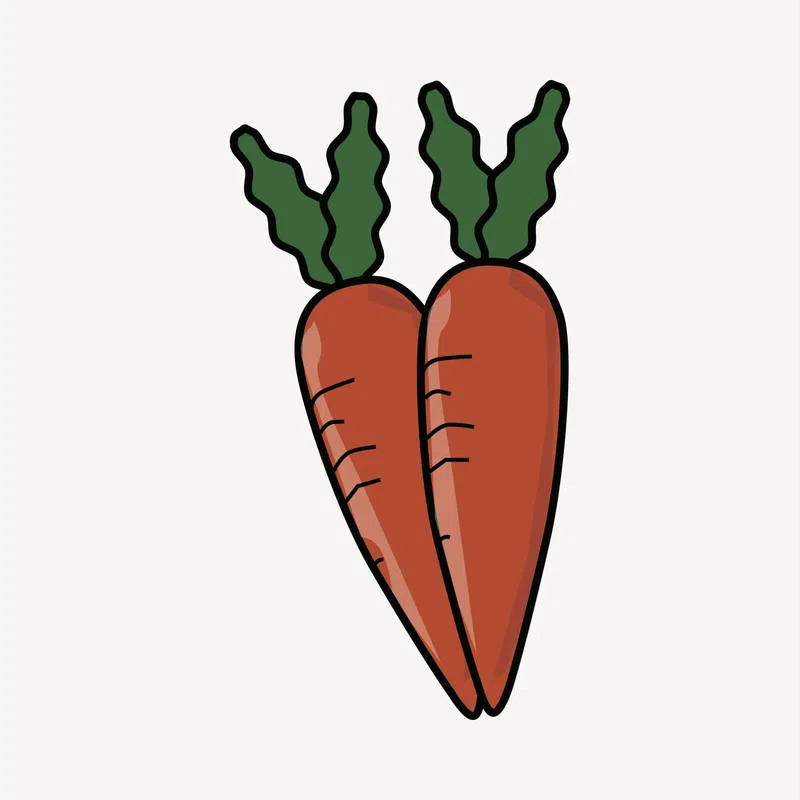
According to me, Do you want to know how much vitamin K is in Carrots 🥕 Have Vitamin K. An important mineral that supports bone health and blood coagulation is vitamin K. Many green leafy vegetables contain it, but what about carrots? 🥕The topic of “Do carrots🥕 have vitamin K?” will be discussed in this article. We will talk about how carrots🥕 fit into a healthy diet, their nutritional advantages, and the significance of vitamin K.
Introduction
A common vegetable, carrots🥕 are frequently used in salads, soups, and snacks. They are renown for their crunchy exterior, sweet flavour, and vibrant orange hue. Additionally nutrient-rich, carrots🥕 provide potassium, fibre, and vitamin A. However, a frequent query is whether carrots🥕 contain vitamin K.
Carrots🥕 are a great source of vitamin A, which is necessary for healthy skin, eyesight, and the immune system.
Carrots 🥕are a good source of fibre, which supports feelings of fullness and aids with digestion.
Carrots🥕 include potassium, which improves heart health and helps control blood pressure.
Carrots🥕 are a good source of vitamin C, which is necessary for skin health and immune system function.
Are Carrots🥕 Vitamin K-Rich?
The short answer to the question “Do carrots🥕 have vitamin K?” is yes, but only in trace levels. 16 micrograms of vitamin K are present in one cup of chopped raw carrots,🥕 according to the USDA National Nutrient Database. This hardly amounts to 20% of the 80 micrograms recommended daily intake (DV) for vitamin K.
Although carrots🥕 do contain vitamin K, this component is not thought to be particularly abundant in them. Focus on vegetables like spinach, kale, and broccoli, which are all high in vitamin K, if you want to improve your consumption of this vitamin.
Vitamin K: It is Vitality
Let’s discuss the benefits of vitamin K now that we are aware that carrots🥕 contain it. Blood calottes require vitamin K, which helps with excessive bleeding when you are hurt. By assisting in the control of the body’s calcium levels, it also contributes to bone health.
Additionally, crucial to heart health is vitamin K. According to studies, those with low vitamin K levels may be more susceptible to cardiovascular disease.
A Healthy Diet and Carrots🥕
Carrots🥕 are a nutrient-rich vegetable that can be included in a balanced diet even if they may not be a significant source of vitamin K. Carrots🥕 are a fantastic food option for weight management because they are low in calories and high in fibre.
In addition to being adaptable, carrots 🥕can be used in a wide range of meals, including salads, soups, and side dishes. They can be prepared as a main entrée or eat raw as a snack.
Carrots🥕 are still a healthy food choice if you want to enhance your vitamin K intake. Just make sure to get additional vitamin K sources as well.
YOUTUBE: Do Carrots Have Vitamin K
FAQs
Carrots do, in fact, contain vitamin K.
Approximate 6% of the daily recommended dose of vitamin K is found in one medium-size carrot.
Yes, vitamin K is necessary for blood clotting and maintaining strong bones.
Vitamin K aids in blood clotting, prevents osteoporosis, and maintains strong bones.
High doses of vitamin K may be problematic for people with blood clotting abnormalities and may conflict with blood-thinning drugs.
Additional FAQs
Age & gender-specific recommendations for vitamin K intake range from 90 to 120 mcg per day for adults.
Vitamin K is abundant in green leafy foods including spinach, kale, & collard greens.
You can increase in the amount of vitamin K in your diet by consuming a variety of green leafy vegetables as well as additional foods high in vitamin K, such as a broccoli & the Brussels sprouts.
Overdosing on vitamin K can make blood-thinning drugs ineffective and may be problematic for those with blood-clotting disorders.
Yes, the majority of people can obtain enough vitamin K from food alone.
However, it is normally advised to obtain vitamins through food sources whenever possible. Vitamin K pills are available.
Before taking any vitamin K supplements, you should consult your doctor if you are using blood-thinning medication.
The creation of specific proteins involved in blood clotting requires vitamin K.
The absorption of vitamin K can be hampered by some digestive conditions, such as a Crohn’s disease and celiac disease, & this can result in a shortfall.
You are probably getting enough vitamin K if you consume a balanced diet that includes green leafy vegetables & other foods high in the vitamin.
Conclusion
As a result, even though carrots🥕 do contain vitamin K, they are in much lower concentrations than in other meals. If you are worried about your vitamin K intake, it’s crucial to incorporate other sources of this nutrient into your diet, such as leafy green vegetables, broccoli, and asparagus. Carrots🥕 can still be a healthy addition to a balanced diet. In order to prevent any potential interaction with the efficiency of the blood-thinning medicine, it’s crucial to consistently consume foods high in vitamin K, such as carrots.🥕
Thank you for visiting our site: Do Carrots Help Your Vision